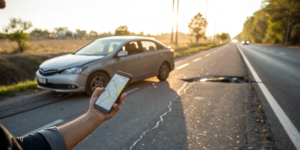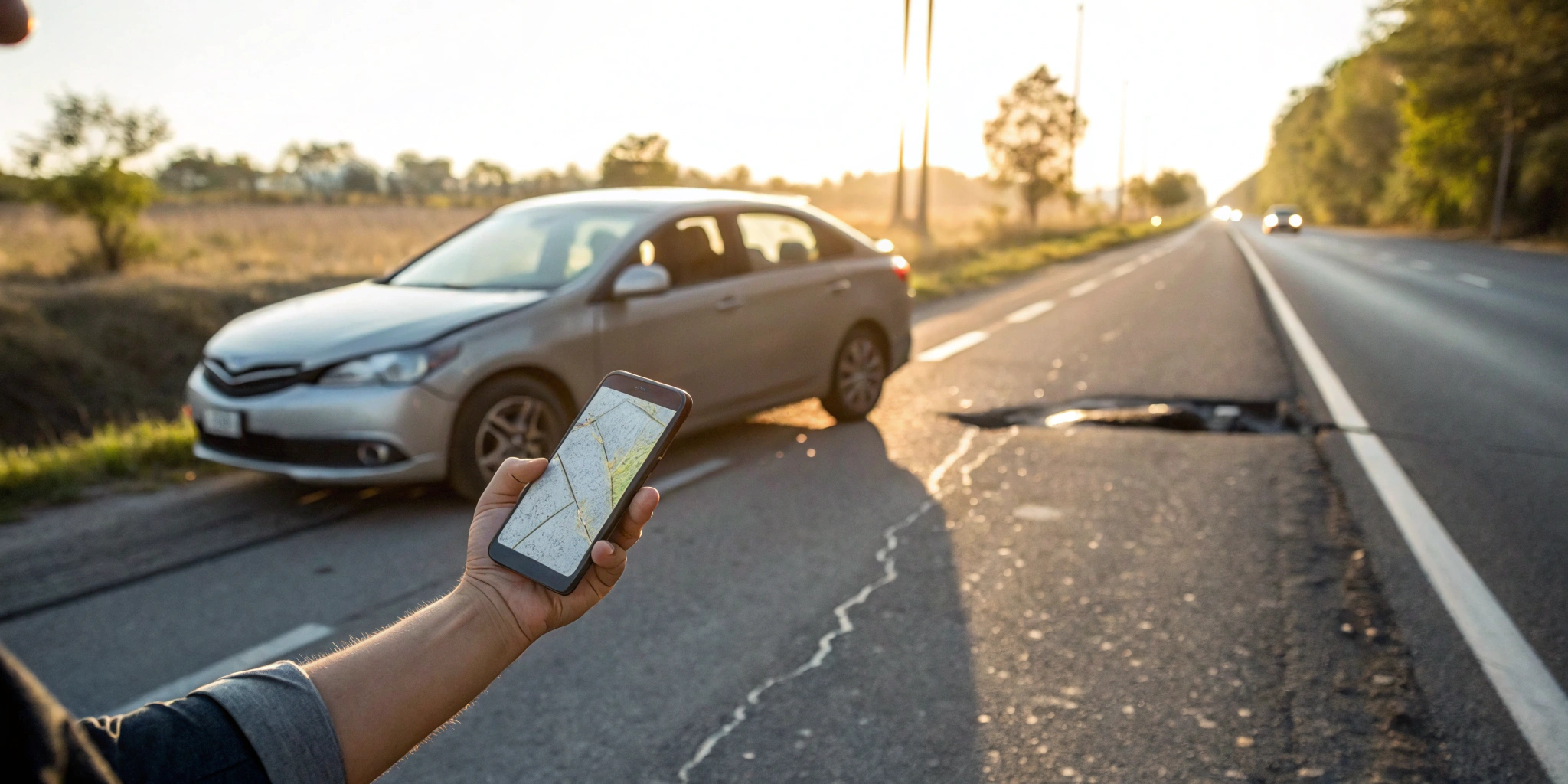A car accident is stressful enough. But finding out the driver who hit you has no insurance can turn a bad situation into a financial nightmare. Suddenly, you’re not just dealing with injuries and recovery—you’re facing hospital bills and lost wages with no one to hold accountable. This is the exact reason uninsured motorist bodily injury (UMBI) coverage exists. It’s a vital part of your own auto policy that steps in to cover your costs when the at-fault driver can’t. Think of it as your financial safety net, ensuring someone else’s irresponsibility doesn’t derail your life and your finances.
Key Takeaways
- UMBI is your shield against irresponsible drivers: This coverage is your financial safety net, stepping in to pay for your medical bills, lost income, and pain and suffering when you’re injured by a driver with no insurance.
- It covers what your other policies won’t: Don’t mistake health insurance or collision coverage for complete protection. UMBI is specifically designed to fill critical gaps by compensating you for lost wages and non-physical damages after an accident.
- Match your limits for maximum protection: A smart strategy is to select UMBI coverage limits that are equal to your own liability coverage. State minimums are often too low to cover the costs of a serious injury, so it’s wise to opt for more robust protection.
What is Uninsured Motorist Bodily Injury (UMBI) Coverage?
You do everything right on the road—you follow the speed limit, use your turn signals, and have the proper insurance. But you can’t control what other drivers do. If someone without insurance hits you, you could be left with serious injuries and a mountain of medical bills. This is where Uninsured Motorist Bodily Injury (UMBI) coverage becomes so important. It’s a specific type of protection designed for a worst-case scenario that happens more often than you might think.
A Simple Definition of UMBI
Let’s break it down. Uninsured Motorist Bodily Injury (UMBI) coverage is your financial safety net when you’re in an accident caused by a driver who has no car insurance. Think of it as a backup plan that steps in to cover your costs when the at-fault driver can’t. Specifically, UMBI pays for medical bills, recovery costs, and related expenses for both you and your passengers. It ensures that you aren’t left to foot the bill for someone else’s mistake, providing peace of mind every time you get behind the wheel.
The Reality: How Many Drivers Are Uninsured?
It’s easy to assume that every driver on the road is insured, but the numbers tell a different story. Across the country, about one in eight drivers—that’s nearly 13%—are uninsured. In some states, that figure jumps to more than one in five. This means every time you drive, there’s a real chance the person in the car next to you has no coverage. An accident can happen in a split second, and if the other driver is uninsured, you could face a difficult road to recovery. Understanding your options after a personal injury is the first step toward protecting yourself.
What Your State Requires
Car insurance laws can feel complicated because they change from one state to the next. About half of all states require drivers to carry some form of uninsured or underinsured motorist coverage. In these states, it’s automatically part of a standard policy. However, in the other half, it’s often an optional add-on that you have to choose to include. It’s a good idea to pull out your own insurance policy and see what’s covered. Even if your state doesn’t require UMBI, the risk of encountering an uninsured driver makes it a valuable addition to your plan.
Clearing Up Common UMBI Myths
Many people believe that if they have health insurance and collision coverage, they’re fully protected. This is a common and costly misunderstanding. Collision coverage only pays for damage to your vehicle, not your medical bills. While your health insurance can help, it often comes with high deductibles, copays, and coverage limits. UMBI is different—it’s a separate, vital layer of protection specifically for injuries caused by an uninsured driver. It fills the gaps left by other policies, ensuring your medical needs are met without draining your savings. If you’re dealing with an accident and feel lost, a free consultation can help clarify your rights.
What Does UMBI Cover After an Accident?
When you’re in an accident with an uninsured driver, it’s easy to feel like you’re out of options. How will you pay for your hospital bills? What about the time you have to take off work? This is exactly where Uninsured Motorist Bodily Injury (UMBI) coverage steps in. Think of it as a safety net that protects you and your finances when the person at fault can’t pay for the harm they’ve caused.
UMBI is designed to cover the costs associated with physical injuries—not damage to your car. Its scope is surprisingly broad, going far beyond just the initial emergency room visit. This coverage can help with ongoing medical care, compensate for lost income, and even provide for less tangible damages like pain and suffering. It’s a crucial part of your policy that ensures one person’s lack of insurance doesn’t derail your life. Understanding what UMBI covers can help you make a clear-headed plan for recovery and ensure you’re getting the full support you’re entitled to.
Your Medical Bills and Recovery
After an accident, medical expenses can pile up quickly. UMBI coverage is your first line of defense, paying for medical bills for both you and your passengers. This isn’t just for the ambulance ride or the initial hospital stay. It can cover a wide range of recovery costs, including follow-up doctor appointments, physical therapy, prescription medications, and any necessary medical equipment. The goal is to help you get the care you need to heal without the overwhelming stress of figuring out how to pay for it, especially when the at-fault driver has no insurance to contribute.
Lost Wages from Missed Work
A serious injury can keep you out of work for weeks or even months, putting a major strain on your finances. UMBI coverage can help by compensating you for the money you lose from being unable to work. This is a critical benefit because your regular bills don’t stop just because your income does. By covering lost wages, this insurance helps you stay financially stable so you can focus on what’s most important: your recovery. If you’re facing mounting costs after an accident, understanding your rights is the first step toward securing your financial future.
Compensation for Pain and Suffering
Some of the deepest impacts of a car accident aren’t visible. Unlike your health insurance, UMBI can provide compensation for the physical pain and emotional distress you experience. This legal concept, known as “pain and suffering,” acknowledges the significant, non-financial toll an injury can take on your life. It covers things like chronic pain, anxiety, and the loss of enjoyment of life. While no amount of money can erase what happened, this compensation is meant to provide a sense of justice and help you manage the profound personal impact of a serious personal injury.
Wrongful Death Benefits
In the most tragic cases where an accident results in a fatality, UMBI coverage can provide essential financial support to the surviving family members. These benefits can help cover immediate costs like funeral and burial expenses, which can be a heavy burden during an already devastating time. Beyond that, this coverage can also help compensate for the loss of the deceased’s future income and the profound emotional loss suffered by the family. It’s a vital provision that offers a measure of financial stability and support when a family is facing its most difficult moments.
Protection for Your Passengers
When you have passengers in your car, you want to know they’re protected. UMBI coverage extends to anyone riding with you who is injured in an accident caused by an uninsured driver. This is incredibly important, as your passengers might not have adequate health insurance of their own to cover their medical bills. By covering their injuries, your UMBI policy acts as a crucial safeguard for your friends and family. It ensures everyone in your vehicle has access to the necessary medical care without having to bear the financial burden themselves.
What to Do in a Hit-and-Run
A hit-and-run accident leaves you with no one to hold accountable. In these situations, your UMBI coverage is designed to step in. Because the at-fault driver fled the scene, they are treated as an uninsured motorist for insurance purposes. Your policy can cover your medical bills, lost wages, and other related damages just as it would if the driver had stayed but had no insurance. If you’ve been the victim of a hit-and-run, it’s important to act quickly. After reporting the incident to the police, you should contact an attorney to understand how to file a UMBI claim.
How UMBI Differs From Other Insurance
Car insurance policies can feel like a puzzle, with different types of coverage that seem to overlap. Understanding what makes Uninsured Motorist Bodily Injury (UMBI) coverage unique is key to making sure you’re fully protected. Let’s break down how UMBI compares to other common forms of insurance so you can see exactly where it fits into your safety net.
UMBI vs. Liability Insurance
Think of liability insurance as your coverage for others. If you cause an accident, your liability insurance pays for the other person’s vehicle repairs and medical bills. On the flip side, Uninsured Motorist Bodily Injury coverage is all about protecting you. It steps in to cover your medical expenses when you’re injured by a driver who has no insurance at all. While liability insurance is required in most states to protect other drivers from you, UMBI is optional coverage you buy to protect yourself from irresponsible drivers. It’s a crucial layer of defense in a world where not everyone follows the rules.
UMBI vs. Medical Payments (MedPay)
Medical Payments coverage, or MedPay, is designed to pay for your (and your passengers’) immediate medical bills after an accident, no matter who was at fault. It’s often a quick and straightforward way to cover initial costs like an ambulance ride or emergency room visit. However, MedPay usually has lower coverage limits. UMBI is different because it’s specifically for accidents caused by an uninsured driver and can cover much more extensive costs. Beyond just medical bills, UMBI can also help with long-term expenses and lost wages, which MedPay typically doesn’t cover.
UMBI vs. Personal Injury Protection (PIP)
Personal Injury Protection (PIP) is similar to MedPay in that it covers your medical expenses and lost wages regardless of who is at fault. It’s required in “no-fault” states. The main distinction is that PIP is your first line of defense for your own injuries in any accident. In contrast, uninsured motorist coverage only applies in the specific scenario where an uninsured driver is at fault for your injuries. Think of PIP as broad, no-fault coverage for yourself, and UMBI as specific protection against another driver’s lack of insurance.
UMBI vs. Underinsured Motorist (UIM) Coverage
This is a common point of confusion, but the difference is simple. Uninsured Motorist (UMBI) coverage protects you when the at-fault driver has no insurance. Underinsured Motorist (UIM) coverage, on the other hand, applies when the at-fault driver has insurance, but their policy limits aren’t high enough to cover all of your medical bills. Often, UM and UIM coverage are bundled together, but they address two different—and equally frustrating—situations. Both are designed to fill the financial gap left by an irresponsible driver.
UMBI vs. Your Health Insurance
You might think your health insurance is enough to cover you after an accident, and while it will certainly help with medical bills, it won’t cover everything. Health insurance policies often come with high deductibles and copays that you’ll have to pay out-of-pocket. More importantly, health insurance does nothing to compensate you for lost wages if you can’t work, or for the pain and suffering you endure after a serious injury. UMBI is designed to fill these critical gaps, providing more comprehensive financial support when you need it most.
How to Choose the Right UMBI Coverage
Picking the right insurance can feel overwhelming, but understanding your Uninsured Motorist Bodily Injury (UMBI) options is a crucial step in protecting yourself and your family. It’s about making sure you’re not left with a mountain of bills because of someone else’s mistake. Think of it as a safety net for the unexpected. When you’re ready to review your policy, focus on what you truly need to feel secure on the road. Let’s walk through how to choose the right UMBI coverage for you, step by step.
Assess Your Coverage Needs
First, take a moment to think about what would happen if you were in a serious accident caused by a driver with no insurance. Uninsured Motorist (UM) coverage is designed specifically for this scenario. Consider your health insurance deductible and out-of-pocket maximums. Would you be able to cover them easily? What about your regular expenses if you couldn’t work for a few weeks or months? Your UMBI coverage should be enough to handle potential medical bills, physical therapy, and lost wages without causing financial strain. It’s about preparing for the worst-case scenario so you can focus on recovery after a personal injury instead of worrying about money.
What Coverage Amount Is Right for You?
A great starting point is to choose UMBI limits that match your own liability coverage. If you have $100,000 in bodily injury liability per person and $300,000 per accident, you should aim for the same amount in UMBI coverage. Many insurance experts recommend carrying at least 100/300/100 coverage to be safe. This ensures you have the same level of protection for yourself that you provide for others. While state minimums are a legal requirement, they are often not enough to cover the costs of a serious accident. Selecting higher limits gives you a much stronger financial cushion if you ever need it.
What Affects the Cost?
You might be surprised by how affordable UMBI coverage can be. Many drivers find that adding it to their policy is a small price to pay for significant peace of mind. The cost will depend on your driving record, location, and the coverage limits you choose, but it’s generally inexpensive compared to the massive expenses it can save you from. Another plus is the deductible. The deductible for UM/UIM coverage is often around $250, which is typically much lower than the deductible for collision coverage. This makes it more accessible to use the coverage when you need it most without a huge upfront cost.
Explore Your Policy Options
When you buy auto insurance, the company is required to offer you uninsured motorist coverage. You won’t be automatically enrolled, but they can’t hide the option from you, either. If you decide you don’t want it, you usually have to reject it in writing. This means you have to make a conscious choice to turn down this protection. Before you do, carefully review your policy documents and talk to your insurance agent. Ask them to walk you through the different coverage levels and costs. Understanding your options is the best way to make an informed decision that you feel confident about.
Check Your State’s Minimums
Insurance laws vary quite a bit from state to state. In fact, about half of all states require drivers to carry at least one type of UM/UIM coverage. It’s important to know what your state’s minimum requirements are, but don’t assume that the minimum is enough. For example, Texas law requires drivers to have at least $30,000 for one person’s injury and $60,000 total for injuries per accident. In a serious crash, medical bills can easily exceed these amounts. Always view the state minimum as the floor, not the ceiling, and choose a coverage amount that truly protects your financial well-being.
What to Expect When Filing a UMBI Claim
Filing an insurance claim can feel overwhelming, especially when you’re focused on recovering from an accident. But your Uninsured Motorist Bodily Injury (UMBI) coverage is there to protect you, and knowing the steps involved can make the process much smoother. Think of it as a roadmap to getting the support you deserve. With the right preparation and a clear understanding of the process, you can confidently handle your claim and focus on what matters most—your health and well-being. Let’s walk through what you can expect, from gathering your documents to handling common hurdles.
Gather the Right Paperwork
Your claim is only as strong as the evidence supporting it. Before you even contact your insurance company, start collecting every piece of paper related to the accident and your injuries. This includes the official police report, all of your medical bills and records, and proof of any income you’ve lost from being unable to work. Creating a comprehensive file with all this information allows you to present a clear and complete claim to your insurer. Strong documentation is your best tool for demonstrating the full extent of your damages and is a critical first step in any personal injury case.
The Step-by-Step Claims Process
The good news is that filing a UMBI claim usually follows the same basic procedure as any other car accident claim. The first thing you need to do is notify your own insurance company about the accident as soon as possible. Be prepared to provide them with all the details you have, including the date, time, location, and a description of what happened. From there, they will assign a claims adjuster to your case and guide you through their specific process. It’s important to be prompt and thorough in your communication to keep things moving forward without unnecessary delays.
Important Legal Factors to Consider
Remember, your UMBI coverage is a part of the insurance policy you pay for. It’s designed specifically to cover your medical costs, pain and suffering, and other damages when the at-fault driver has no insurance. This isn’t a handout; it’s a contractual benefit. However, insurance companies sometimes try to minimize payouts, even to their own policyholders. Understanding the legal details of your policy can be tricky, which is why having an experienced attorney on your side is so valuable. We can help interpret the fine print and ensure your rights are protected. If you have questions, you can always contact us for a free consultation.
How Long Will Your Claim Take?
One of the most common questions is, “How long will this take?” Unfortunately, there’s no single answer. The timeline for a UMBI claim can vary widely depending on several factors. A straightforward case with clear evidence and minor injuries might resolve in a few months. However, a more complex case involving serious injuries or disputes over fault could take much longer. The insurance company’s willingness to negotiate fairly also plays a big role. While it’s a frustrating reality, patience is key. An attorney can help manage the process and apply pressure on the insurer to prevent unnecessary delays.
Common Roadblocks and How to Handle Them
You might run into a few bumps in the road. Sometimes, the insurance company may dispute who was at fault for the accident or question the severity of your injuries. This is why calling the police from the scene of the accident is so important—the official report provides an objective account of what happened. To counter arguments about your injuries, keep detailed records of all your medical treatments and follow your doctor’s orders precisely. Being organized and proactive is your best strategy for overcoming these challenges. Having a dedicated legal team that knows how to handle these roadblocks can make all the difference.
Related Articles
- Uber Accident Lawyer: A Guide to Your Claim
- What If Your Uber or Lyft Driver Was Uninsured in Alabama? Know Your Rights After a Rideshare Crash
- How to Find the Best Motorcycle Accident Attorney
Frequently Asked Questions
What’s the first thing I should do if an uninsured driver hits me? Your first priority is safety. Call 911 to get medical help for anyone who is injured and to have the police come to the scene. An official police report is essential for proving the other driver was at fault and uninsured. After you’ve seen a doctor, you should notify your own insurance company to begin the process of filing a UMBI claim.
Does UMBI cover damage to my car? No, Uninsured Motorist Bodily Injury coverage is specifically for people, not property. It is designed to pay for medical expenses, lost income, and pain and suffering for you and your passengers. Damage to your vehicle would be handled by your collision coverage or a separate policy called Uninsured Motorist Property Damage (UMPD) coverage.
If I have good health insurance, do I still need UMBI? Yes, it’s a smart move to have both. Your health insurance will help with medical bills, but you’ll likely still have to pay deductibles and copays. More importantly, health insurance provides no support for lost wages if you can’t work or compensation for the physical pain and emotional hardship that comes with a serious injury. UMBI is designed to fill those exact financial gaps.
Will my insurance rates go up if I file a UMBI claim? In most cases, no. State laws generally prohibit insurance companies from raising your premiums for using your UMBI coverage when you were not at fault for the accident. You pay for this coverage to protect yourself from this specific situation, and you should not be penalized for using a benefit you’re entitled to.
What if the at-fault driver has insurance, but it’s not enough to cover my bills? This is where a different but related coverage called Underinsured Motorist (UIM) protection comes in. It applies when the at-fault driver has insurance, but their policy limits are too low to cover the full extent of your injuries and losses. Insurance companies often bundle UMBI and UIM coverage together to make sure you’re protected in both scenarios.





